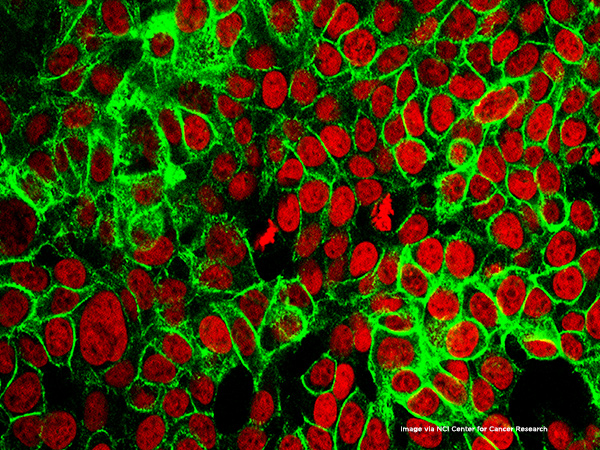A Targeted Therapy Combination for Colorectal Cancer
The FDA has approved a new combination of molecularly targeted therapeutics for treating metastatic colorectal cancer with a BRAF V600E gene mutation.

The U.S. Food and Drug Administration (FDA) has approved expanding the use of the molecularly targeted therapeutic encorafenib (Braftovi) to include its use in combination with another molecularly targeted therapeutic, cetuximab (Erbitux), for treating certain patients with metastatic colorectal cancer.
The new combination of molecularly targeted therapeutics is intended for treating adults who have metastatic colorectal cancer that tests positive for a genetic mutation called the BRAF V600E mutation and that has progressed despite other treatments. It is the first molecularly targeted therapy combination approved for treating colorectal cancer.
Colorectal cancer is the third most commonly diagnosed cancer in the United States, with more than 147,000 cases expected to be diagnosed in the United States in 2020, according to the National Cancer Institute (NCI).
Research, including an analysis of the American Association for Cancer Research (AACR) Project GENIE registry that was published in the AACR journal Cancer Discovery in 2017, shows that about 10 percent of colorectal cancers have mutations in the BRAF gene. Patients with BRAF-mutant colorectal cancer have a particularly poor prognosis, with one study showing that overall survival for patients with this type of colorectal cancer was just 10.4 months, compared with 34.7 months for patient with colorectal cancer without a BRAF mutation.
These data led researchers to test whether BRAF-targeted therapeutics, which had been used successfully in the treatment of BRAF-mutant melanoma, might provide a new treatment option for patients with BRAF-mutant colorectal cancer. However, few patients with BRAF-mutant colorectal cancer had tumor shrinkage following treatment with a BRAF-targeted therapeutic alone.
Further research revealed that one reason that colorectal cancers with the BRAF V600E mutation did not respond to BRAF-targeted therapeutics was that the cancer cells were receiving signals to multiply through another molecule, called EGFR. This led to the idea that combining a BRAF-targeted therapeutic and an EGFR-targeted therapeutic might be beneficial.
Encorafenib is a BRAF-targeted therapeutic and cetuximab is an EGFR-targeted therapeutic. This combination of molecularly targeted therapeutics was approved by the FDA for treating patients who have metastatic colorectal cancer that tests positive for the BRAF V600E mutation based on results from the randomized, phase II BEACON CRC clinical trial. The results, which were published in The New England Journal of Medicine¸ showed that among the 220 patients who received encorafenib and cetuximab, the median overall survival was 8.4 months. This was significantly greater than the median overall survival among the patients who received cetuximab and cytotoxic chemotherapy, which was 5.4 months.
Before this approval for metastatic colorectal cancer, encorafenib was approved by the FDA for use in combination with the MEK-targeted therapeutic binimetinib for treating certain patients with melanoma in June 2018.
The FDA approval was rendered on April 8, 2020.